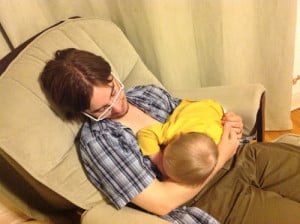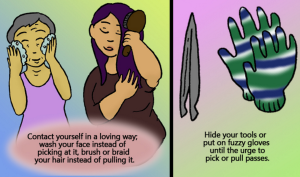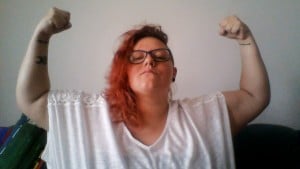
Source: Milk Junkies
Originally published on The Huffington Post and republished here with the author’s permission.
Near the end of my pregnancy, I went to my first breastfeeding support meeting, facilitated by La Leche League. I was excited at the opportunity to learn, and terribly nervous in a room full of strangers – I was a guy at a women-only peer-to-peer help group.
La Leche League is an international nonprofit organization dedicated to supporting and educating women who want to breastfeed. When it was my turn to speak, I gave my carefully prepared spiel:
My name is Trevor, and I am able to be pregnant because I am transgender. This means that I was born female but transitioned to male by taking hormones and having chest surgery. When my partner and I decided to start a family, we got advice from my doctors, and I stopped taking my testosterone. My baby is due in April. Because my surgery removed most of my breast tissue, I don’t know how much I’ll be able to breastfeed, but I really want to try.
With my face bright red and my palms sweating, I looked up to see many of the women in the room nodding their heads and smiling at me.
By this point I was quite far along in my pregnancy, so they knew I was the real thing. Over the course of the meeting, people discussed their various nursing challenges and asked each other questions. I mostly remained silent.
After it was over, several women came to me to say how impressed they were by my determination to breastfeed and that they hoped it would go well for me.
I was ecstatic at their response – I’d been initially unsure of whether I’d even be allowed to attend an LLL meeting as a guy, and I certainly didn’t expect to be welcomed with open arms.
This was the beginning of what became an incredible support system that I credit with helping me to nurse my baby for his first year of life.
At the start of our pregnancy, my partner Ian and I assumed we were going to formula-feed. We signed up for samples of the stuff – how could we resist free food? We like a good deal just as well as the next guys. Besides, how could I breastfeed without breasts?
And then I started reading endlessly about birth and babies. Quickly I learned that I might be able to produce a small amount of milk, despite my surgery, and that even drops of breast milk would benefit our baby. I became not just committed, but passionate about breastfeeding.
Following a natural birth, my midwife assisted me in latching on my newborn, Jacob. To everyone’s delight and amazement, we could all hear him enjoying his first swallows of colostrum, the rich milk full of protective antibodies that is produced in the first days after birth.
We called my best friend and La Leche League leader, Simone, to come over right away.
When Simone entered our bedroom and saw me trying to latch Jacob on, this time without the help of my midwife, she thought it would be impossible. Her concern was that there wouldn’t be enough tissue there for a baby to latch onto. And that I would be devastated when it didn’t work out. She made a few suggestions. I persisted, and so did my baby.
Simone came to our home four times in the next 48 hours and answered my phone calls late at night as well as early in the morning. Jacob got stronger as I became more proficient in positioning him, and we learned together.
However, when he was four days old, it became clear that he wasn’t gaining weight adequately and that we needed to start supplementing. Friends, and friends of friends, donated their breast milk for our child, and now I faced yet another challenge: using a supplementer.
A supplementer is a bottle with a tube going into it. You put one end of the tube next to your nipple and then latch the baby onto your nipple and the tube at the same time. This way, the baby gets both the milk that the parent can produce and supplement from the bottle at once.
The goals of using a supplementer were to avoid “nipple confusion” and to stimulate my own body to create more milk. At first it took three of us to position Jacob, hold the supplementer and its tubing, and make an effective “breast tissue sandwich” for the baby to hold onto.
For the next two weeks, Ian had to help me with every single feeding. We struggled through the exhaustion of sitting up through nursing sessions day and night.
We found more donated breast milk online through the Facebook group Human Milk 4 Human Babies. We interviewed donors, asking about blood test results, medications, and drug and alcohol use. We accepted donations from all kinds of people, including Mennonites, Mormons, and a military family.
All of these generous people dedicated their time and energy to giving our child a healthy start in life. In the end we were able to find enough breast milk for Jacob to stay off of formula entirely.
As Jacob enters toddlerhood, breastfeeding is about far more than the food. I can nurse him to sleep when he is overtired, or latch him on to calm him when he’s had an unfortunate adventure with the corner of a coffee table. Nursing has taken on dimensions that I never imagined would be possible for us.
Best of all, when I attend La Leche League meetings nowadays, I am able to give advice to brand new breastfeeding parents.
If a new mom worries that she doesn’t have enough breast milk because her baby seems to want to eat so very often, I can share my story: We were supplementing our son heavily, but he continued to want to feed in many frequent sessions.
Sometimes, he cried at night despite having as much milk as he could eat. Those early days can be tough, and I was fortunate to have extraordinary support.
I will forever think of our many compassionate helpers – the La Leche League leaders, our friends, and the complete strangers we met online – as Jacob’s milk buddies.
It certainly took a village for us to breastfeed, and I am so grateful that it happened.
[do_widget id=’text-101′]
Trevor MacDonald is a transgender man from Manitoba who birthed both his children at home and breastfeeds them. He initiated and helped to design and analyze a University of Ottawa study focusing on the experiences of transmasculine individuals with pregnancy, birth, and infant feeding. The study is funded by the Canadian Institutes of Health Research – Institute of Gender and Health. Trevor blogs at milkjunkies.net and has a memoir in development with the University of Manitoba Press. He runs a support group on Facebook called Birthing and Breastfeeding Transmen and Allies.
Search our 3000+ articles!
Read our articles about:
Our online racial justice training
Used by hundreds of universities, non-profits, and businesses.
Click to learn more




















